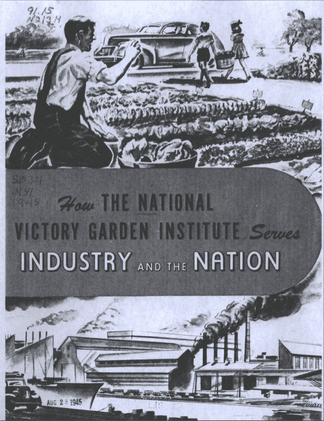Rethinking American Agriculture: Fertilized Farms and Victory Gardens
 How the National Victory Garden Institute Serves Industry and the Nation. (New York: The Institute, 1945).
How the National Victory Garden Institute Serves Industry and the Nation. (New York: The Institute, 1945). For the post, the brilliant Timothy Johnson and I were paired up to talk about our respective research projects, and together tackle the new directions the field of environmental history is taking, from where our work overlaps in the history of twentieth century agriculture.
Tim's dissertation (recently defended, bravo!), is a compelling and incisive examination of the global fertilizer industry in transition from the nineteenth to the twentieth centuries, whereas mine focuses on backyard gardens in four crucial years of war from 1941-1945. However, in discussion, we were able to find many commonalities in our intellectual premises, approaches, and contributions to the field.
At a basic level, we concured that research in the overlap between business, state, and environment is more important than ever, given the incoming political regime on January 20th. Indeed, huge numbers of businessmen and corporate interests are poised to be at the helm for the next four years, judging by Trump's cabinet picks, even as the crisis of global warming will reach new heights of urgency.
However, other topics that came up in conversation included:
- The business community's attempts to "naturalize" capitalism in American society and practice
- Corporations as important historical actors in the ongoing American relationship with the environment, both in collaboration and conflict with the state.
- The importance of practices as well as products, of networks as well as the fruits of those relationships.
- Materiality as important to the past, especially environmental pasts; we are each in some way looking to describe how capitalist practices and products were concretized and embodied in the past.
- The American rhetoric of food production as key to construction of American abundance through corporate science and technology.
Most of all, our work each rests on the premise that agriculture is a uniquely useful site to examine the complex relationship between business, state, and the natural environment. As well as being rhetorically important to the American identity through the legacy of the yeoman farmer ideal, agriculture is a crucial domain of environmental interaction and impact: a place where science and technology meet with people and ecologies; where capitalist growth economies run up against natural limits of soil fertility and weather conditions; where disembodied global commodity chains of seeds, fertilizer, machinery, and food meet with local soil and dirt.
 RSS Feed
RSS Feed